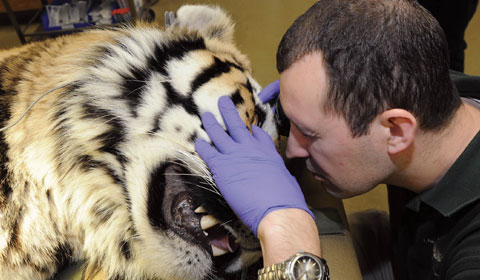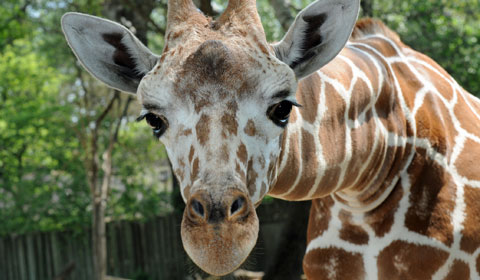New Release
Contact: Sondra Katzen, Public Relations, 708.688.8351, Sondra.katzen@czs.org
February 14, 2019
FOR IMMEDIATE RELEASE
A Special Valentine’s Day Birth at Brookfield Zoo - Tiny Antelope Named Valentino
Photo Captions—credit Cathy Bazzoni/Chicago Zoological Society
68 and 52: Valentino, a Kirk’s dik-dik (a small African antelope) was born on Valentine’s Day.
41: Alicia Grano, an animal care specialist at Brookfield Zoo, with Valentino, a Kirk’s dik-dik. Valentino was born today on Valentine’s Day.
58: Dr. Julie Sheldon, a veterinary resident, and Alicia Grano, an animal care specialist, with Valentino, a Kirk’s dik-dik who was born at Brookfield Zoo today on Valentine’s Day.
Brookfield, Ill. – A tiny African antelope known as a Kirk’s dik-dik was born at Brookfield Zoo in the early morning hours this Valentine’s Day, February 14. The male calf named Valentino weighs just over 23 ounces.
This is the second successful birth for mom, Chloe, and the first for Captain, the 6-year-old sire. The Association of Zoos and Aquariums’ Species Survival Plan recommends that calves of this species be handreared to ensure they have a calm demeanor as adults. The zoo’s animal care staff is working closely with the veterinarians and nutritionist during the handrearing period to make sure Valentino receives the proper diet and reaches certain milestones. Currently, he will receive a bottle of milk formula every four hours. When he is about a week old, he will be introduced to solid foods.
Within the first three weeks Valentino may gain up to 1.5 ounces a day—doubling his weight in that time period. At 5 weeks old, his weight will triple. Once full grown, he will weigh approximately 12 to 14 pounds and measure 14 to 16 inches tall at the shoulder.
Kirk’s dik-diks are one of the smallest antelopes in the world. These small antelopes vary in color depending on their habitat. Their large, striking, dark eyes that are each surrounded by a white ring can identify them best. Interestingly, over time, dik-diks have developed a self-cooling mechanism within their snouts that keeps them from overheating in extreme temperatures. This system also helps minimize their need for water. Yet, dik-diks in the wild are mostly nocturnal to avoid the heat of day and prevent unnecessary water loss.
Dik-diks are herbivorous mammals that primarily eat foliage, shoots and berries, which is where they consume their water. They can live in both dense forests and open plains and are found throughout Africa, particularly in the Kenyan, Namibian, Tanzanian, South African, Kazungula, Kilimanjaro regions. The species is listed as least concern on the International Union for Conservation of Nature’s Red List due to its widespread distribution and presence in a number of protected areas. Its population is stable throughout much of its range. However, in some densely human inhabited areas its numbers are declining. Currently, there are 32 dik-dik antelopes in 17 North American zoos.
# # #
About the Chicago Zoological Society
The mission of the Chicago Zoological Society is to inspire conservation leadership by engaging people and communities with wildlife and nature. The Chicago Zoological Society is a private nonprofit organization that operates Brookfield Zoo on land owned by the Forest Preserves of Cook County. The Society is known throughout the world for its international role in animal population management and wildlife conservation. Its Center for the Science of Animal Care and Welfare is at the forefront of animal care that strives to discover and implement innovative approaches to zoo animal management. Brookfield Zoo is the first zoo in the world to be awarded the Humane Certified™ certification mark for the care and welfare of its animals, meeting American Humane Association’s rigorous certification standards. Open every day of the year, the zoo is located at 8400 31st Street in Brookfield, Illinois, between the Stevenson (I-55) and Eisenhower (I-290) expressways and also is accessible via the Tri-State Tollway (I-294), Metra commuter line, CTA and PACE bus service. For further information, visit CZS.org.
MEDIA CONTACT:
Sondra Katzen
Media Relations Manager
Office: 708-688-8351
Cell Phone: 708-903-2071
E-mail: Sondra.Katzen@CZS.org

Read about our innovative practices in animal welfare to ensure the ultimate care of our individual animals.

Create extraordinary connections with animals and nature!

Become our partner in caring for animals and in connecting people with wildlife and nature.